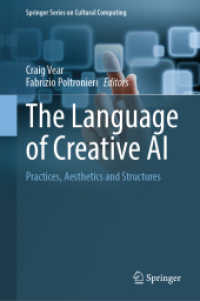Full Description
From the first day of class to delivering their final project, this book helps students build all the undergraduate writing skills they'll need during their degree, with practical tools and advice they can use straight away.
It offers:
Everything in one place—from notetaking and structuring essays to writing reports, literature reviews and dissertation.
A clear path to better grades, so they know what to focus on and how to build their skills over time.
Tips for exams, including how to prepare and write under pressure.
Ethical ways to use AI tools to complement your skills.
Support for their wellbeing, with advice on managing stress and knowing when to ask for help.
This practical guide was designed for undergraduate students looking to build confidence in their writing and get better academic results.
Dr. Sue Reeves is the Head of Teaching and Learning within the School of Life and Health Sciences at the University of Roehampton.
Student Success is a series of essential guides for students of all levels. From how to think critically and write great essays to boosting your employability and managing your wellbeing, the Student Success series helps you study smarter and get the best from your time at university.
Contents
Introduction to Part 1. The Skills
Chapter 1: Getting Organised
Chapter 2: Being an Active Learner
Chapter 3: Reading Critically
Chapter 4: Academic Writing and Constructing Academic Arguments
Chapter 5: Referencing
Chapter 6: When to use AI and when not to use it
Chapter 7: Looking after yourself and asking for help
Introduction to Part 2: Written Work
Chapter 8: Writing Essays
Chapter 9: Writing Reports
Chapter 10: Critical Reviews
Chapter 11: Annotated Bibliographies
Chapter 12: Reflective writing, blogs, social media posts
Chapter 13: Writing in exams
Chapter 14: Reviewing your feedback so far
Introduction to Part 3: The Dissertation
Chapter 15: Getting started on your dissertation
Chapter 16: Writing your introduction
Chapter 17: Completing the literature review
Chapter 18: Writing Methodologies
Chapter 19: Planning the results chapter
Chapter 20: Discussions and conclusions
Chapter 21: Abstracts, appendices, editing and proof reading
Chapter 22: Preparing for a viva








